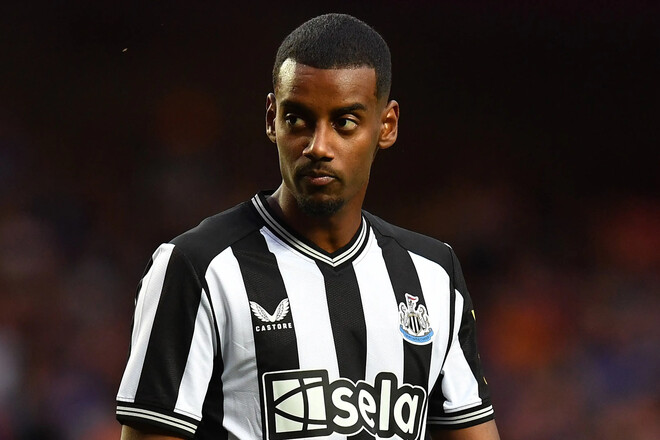As the Premier League season gains momentum, all eyes turn to St. James` Park for the eagerly anticipated clash between Newcastle United and Liverpool. Yet, this isn`t just another fixture in the calendar; it`s a narrative woven with ambition, frustration, and the looming shadow of a single player: Alexander Isak. His dramatic transfer saga isn`t merely a subplot; it`s the very air both clubs breathe, adding an unforeseen layer of intrigue to an already high-stakes encounter.
The Persistent Echo: Isak`s Stand-off with Newcastle
The tale of Alexander Isak and Newcastle United has, in the waning days of the transfer window, blossomed into what many are calling the most dramatic saga of the summer. While he won`t be gracing the hallowed turf of St. James` Park this Monday, his presence is undeniably felt – a silent, yet potent, specter haunting the sidelines.
Isak`s campaign to secure a move has been, shall we say, a masterclass in modern footballing persuasion. Reports of training alone, the rather conspicuous listing of his home for rent in England`s northeast, and a public declaration on Instagram citing “broken promises” all paint a vivid picture. One might almost admire the theatrical flair, if not for the genuine concern it raises for club morale and tactical stability. Newcastle, undoubtedly, finds itself in a precarious position, grappling with a star player who seemingly prefers greener, or perhaps just different, pastures. It`s a testament to the ever-shifting power dynamics between player and club, where contracts occasionally feel more like suggestions than binding agreements.
The Isak effect on Newcastle`s tactical landscape is stark. Without their prolific forward, who boasted an impressive 62 goals in 109 appearances, the Magpies looked blunted in their opening fixture against Aston Villa. Anthony Gordon, a natural winger, found himself spearheading the attack – a square peg in a round hole, trying valiantly to conjure goals where a proven finisher once roamed. Manager Eddie Howe faces the unenviable task of cobbling together an effective attacking unit, seemingly resigned to working with a lineup that, for now, lacks a true focal point.
Liverpool`s Wealth of Attack, Poverty of Defense
On the other side of this intriguing coin stands Liverpool. At first glance, the notion of Alexander Isak joining the Reds seems almost an indulgence. Arne Slot`s revamped attack, featuring the likes of Florian Wirtz and Hugo Ekitike settling in seamlessly alongside the evergreen Mohamed Salah, has demonstrated a potent, almost gratuitous, scoring ability. Their recent 4-2 victory against Bournemouth, following impressive pre-season displays, certainly suggested an offense that`s firing on all cylinders. Adding Isak, one might argue, would simply be adding another diamond to an already glittering crown.
However, football, much like life, loves its ironies. While Liverpool`s forward line appears capable of dismantling almost any defense, their own backline has exhibited a concerning porosity. Conceding twice in both the Community Shield and the Bournemouth match serves as a stark reminder that an abundance of attacking talent cannot always compensate for defensive frailties. The quartet of Jeremie Frimpong, Ibrahima Konate, Virgil van Dijk, and Milos Kerkez, while individually talented, have collectively shown vulnerabilities. Reinforcements are trickling in – the acquisition of 18-year-old Giovanni Leoni from Parma being a long-term investment rather than an immediate solution – but a quick fix for the defensive chinks in the armor remains elusive. Link-ups with Crystal Palace`s Marc Guehi persist, yet a deal remains unsealed. It`s a fascinating paradox: a club with an embarrassment of riches up front, yet a backline that occasionally resembles a revolving door. One clean sheet in pre-season, against a Championship side no less, hardly inspires unwavering confidence.
The Unseen Battle: Tactical Chess and Psychological Warfare
This backdrop of transfer drama and contrasting team dynamics elevates the Newcastle vs. Liverpool match beyond a mere ninety minutes of football. For Newcastle, it`s a test of resilience, of their ability to perform under the psychological weight of an unfolding crisis. Can Eddie Howe rally his troops, inspire them to overcome the void left by their absent star, and demonstrate that the club`s ambition transcends individual sagas?
For Liverpool, it`s a different kind of examination. Can their vibrant attack, even without Isak, continue its free-scoring ways against a desperate Newcastle? More critically, can their defense finally find a semblance of solidity? The match becomes a crucible, forging strategies and exposing vulnerabilities. If Liverpool`s defense falters against a Newcastle side struggling for goals, the whispers about their overall squad balance will inevitably grow louder, particularly as the transfer window`s final moments tick away. The question isn`t just “How would these teams look *with* Isak?”, but rather “How do these teams cope *without* resolution to the Isak question?”
The Bigger Picture: Modern Football`s Unpredictability
The Alexander Isak saga, regardless of its outcome, serves as a poignant illustration of modern football`s unpredictable nature. It`s a game where individual ambitions can clash spectacularly with collective goals, where market forces dictate more than just transfer fees, and where the drama off the pitch often rivals, if not eclipses, the excitement on it.
As the referee`s whistle blows at St. James` Park, signaling the start of this Premier League encounter, football fans will witness more than just a contest for three points. They will be observing a chapter in an ongoing narrative, a story where a player not even on the team sheet casts the longest shadow, shaping the fortunes and anxieties of two major clubs. In a world obsessed with certainty, football, thankfully, continues to revel in its beautiful, chaotic unpredictability.

